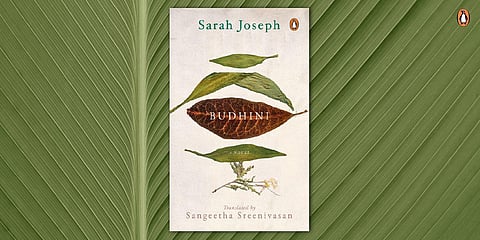

Progress and so-called civilisation demands a heavy price and all too often, it is exacted from scores among the poor, marginalised and disenfranchised. Budhini Mehjan is one among the countless whose lives and livelihoods have been trampled upon by an uncaring society that can’t be bothered with the poverty-stricken unless it is to exploit them. Yet, her story deserves to be told and Sarah Johnson, the highly feted Malayalam novelist and activist, makes a commendable attempt to rescue Budhini from oblivion. Her Budhini: A Novel, translated from Malayalam by Sangeetha Sreenivasan, reminds us of a life that ought not to have been forgotten and seeks to open our eyes to the horrors of unrelenting modernisation with no regard for ecological balance.
When Jawaharlal Nehru went to inaugurate the Panchet Dam, a Rs 19 crore project built after much opposition across the Damodar river, which has occasionally been referred to as the ‘Sorrow of Bengal’, he was welcomed by a 15-year-old Santal girl chosen by the Damodar Valley Corporation (DVC) to do the honours. Her name was Budhini. She shyly garlanded the Prime Minister, dutifully applied the tika on his forehead and at his specific request, pressed the button at the power station to get things off to an auspicious beginning. Young Budhini even made a small speech in her own language and dedicated the dam to the entire nation. Nobody could have predicted that this momentous occasion would prove to be the ruin of the poor Santal girl.
When Budhini returned to Karbona, her native village, she was told by the tribal elders that as per the mandate of bitlaha, she was to be excommunicated for the grave sin of marrying an outsider by garlanding him. She was to have no contact with the villagers, who would not be permitted to talk to her or help in any way, including providing food, water, clothing or a place for her to rest. She was banned from touching wells, ponds, animals and was forbidden from setting foot on the soil lest she defile it. Friends or relatives who transgressed were to be excommunicated. For reasons, that may have had something to do with casteist bias and the scandal around ‘Nehru’s wife’, she was also dismissed from her job.
It is a story not lacking in pathos and the unfairness of it all is staggering. Joseph gives us a fictionalised account of not just Budhini, but others like her who have been given a raw deal. These are people who toil under gruelling circumstances from dawn to dusk but never manage to make enough for even a cup of rice and are forced into debt and destitution. They are strong-armed out of their homes, robbed of their land and left to fend for themselves in doleful conditions. It is a horrendous reality and no one with a conscience will be left unmoved.
Yet, powerful though the material, the book has trouble doing justice to it. The reader is left feeling disconnected from the Santal way of life because of the thick coating of romanticised ideology. Stylistically stilted, puffed up with its own good intentions and manipulative reimagining, the novel is a letdown despite aspiring for literary greatness.
Budhini: A Novel
By: Sarah Joseph
Sangeetha Srinivasan (Translator)
Publisher: Penguin Hamish
Hamilton
Pages: 256
Price: Rs 375 (Hardcover)